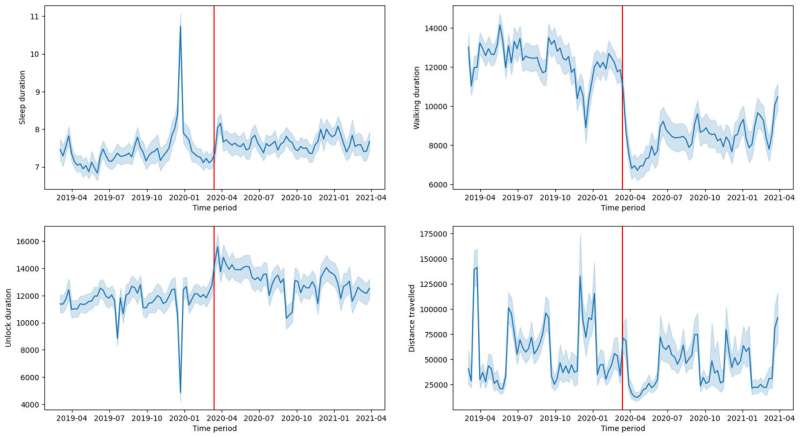Study finds deep divide on mental health impact of COVID-19

COVID-19 is revealing a deep divide in the mental health of college students, with some having much more difficulty with their emotional well-being during the pandemic than others, according to a new Dartmouth study.
The multiyear study comparing the first full year of COVD-19 against the year immediately prior shows how the mental health and behavior of college students has changed in response to the public health crisis.
The study is the first to use mobile technology to compare mental health for the same study group for complete 12-month periods before and during the pandemic, and it demonstrates how smartphone technology and artificial intelligence can be used as an "early detection system" for mental health.
"The pandemic has put students on a literal mental health roller coaster, mostly heading downward," said Andrew Campbell, the Albert Bradley 1915 Third Century Professor of computer science at Dartmouth. "It's become clear, however, that certain people are much worse off and affected than their counterparts as indicated by behaviors that can be continuously assessed through the application of mobile sensing technology."
The longitudinal study used a smartphone app and digital questionnaires to assess depression, anxiety and stress in a volunteer group of 180 college students from one year prior to the pandemic (3/19-2/20) through the first full year of the pandemic (3/20-2/21). By monitoring phone usage, sleep, physical activity and mobility in the same group, researchers were able to detect patterns of behavior and infer details of individual emotional well-being.
The study identified two groups that experience the pandemic very differently. One group had significantly poorer mental health and higher COVID concerns—they slept less, were more sedentary, and used their phones considerably more than the other group. The students with elevated mental health challenges were generally found to have higher depression, anxiety, and stress coupled with lower self-esteem.
In general, heightened COVID-19 concern was found to be strongly linked to increased depression, anxiety and stress. One-third of the study participants reported a heightened COVID-19 concern throughout the entire first year of the pandemic.
"The behavioral changes that we see in the student population concur with the experiences of the general population and are concerning," said Subigya Nepal, a Ph.D. candidate at Dartmouth and first author of the study. "What is truly surprising is the finding that there are subgroups of students who have had differing changes in mental health and behavior."
On average, the study found that student behaviors have shifted and time spent engaging in multiple activities has substantially declined during the pandemic. Students are significantly less active and sleep more, but overall phone usage has increased.
The specific findings on the behavioral impact of the first year of COVID-19 include:
- The amount of time spent at home, sleeping, and sedentary all increased.
- The distances traveled and unique locations visited by college students decreased.
- Phone usage duration in the study group increased, as did social media use.
- The amount of time students spent walking, biking and driving was reduced.
The research is part of the "StudentLife" computer science research program that is assessing the efficacy of using smartphones to identify and predict anxiety, depression and stress in college students. The National Institutes of Health study is following 220 undergraduates across their four years of college.
This is the third research paper from the ongoing study since the onset of the COVID-19 pandemic. It's the only study to be based on full years of data from before and during COVD-19.
"Such a large amount of continuous data spanning two years in total allows us to draw important insights and robust conclusions associated with behavioral change of these students as a result of COVID-19," said Campbell, the lead researcher and co-author of the study.
Given the connection between COVID-19 concern and overall mental health identified in the study, the researchers used machine learning techniques to see if artificial intelligence could predict COVID-19 concerns as an indicator of emotional well-being.
The study, published in the Proceedings of the CHI Conference on Human Factors in Computing Systems, reports a 75% level of precision and concludes that deep learning models can be helpful in classifying COVID-19 concerns. The team suggests that it would be possible to build a machine learning model to predict concern over the pandemic and people who are prone to mental health challenges.
"The technical results are promising," said Nepal. "It appears that we will have to live with the pandemic or some variant of it for some time to come, so the insights from our work will be relevant for identifying and managing the mental health aspects of COVID-19 going forward."
The research team highlights that the study is confined to a limited group of undergraduate students with a demographic attending a selective university. The team urges caution in interpreting the results, as they do not know exactly how well the findings generalize to other populations.
While recognizing the potential of mobile sensing, the team also identifies issues that make use of the technology challenging, including concerns over transparency, validity, and privacy.
Future work will include determining if the technology can be used as an early detection system that could also provide individualized suggestions to help people navigate difficult times or notify a provider with their consent so they can reach out to the individual to provide assistance.
More information: Subigya Nepal et al, COVID Student Study: A Year in the Life of College Students during the COVID-19 Pandemic Through the Lens of Mobile Phone Sensing, CHI Conference on Human Factors in Computing Systems (2022). DOI: 10.1145/3491102.3502043



















